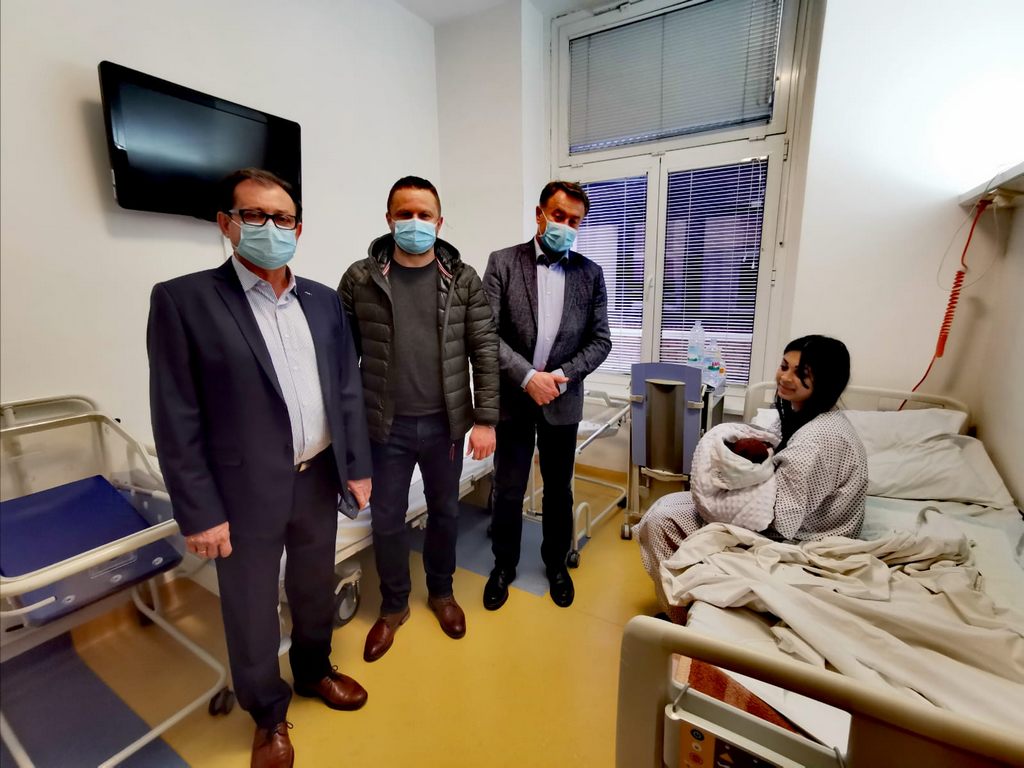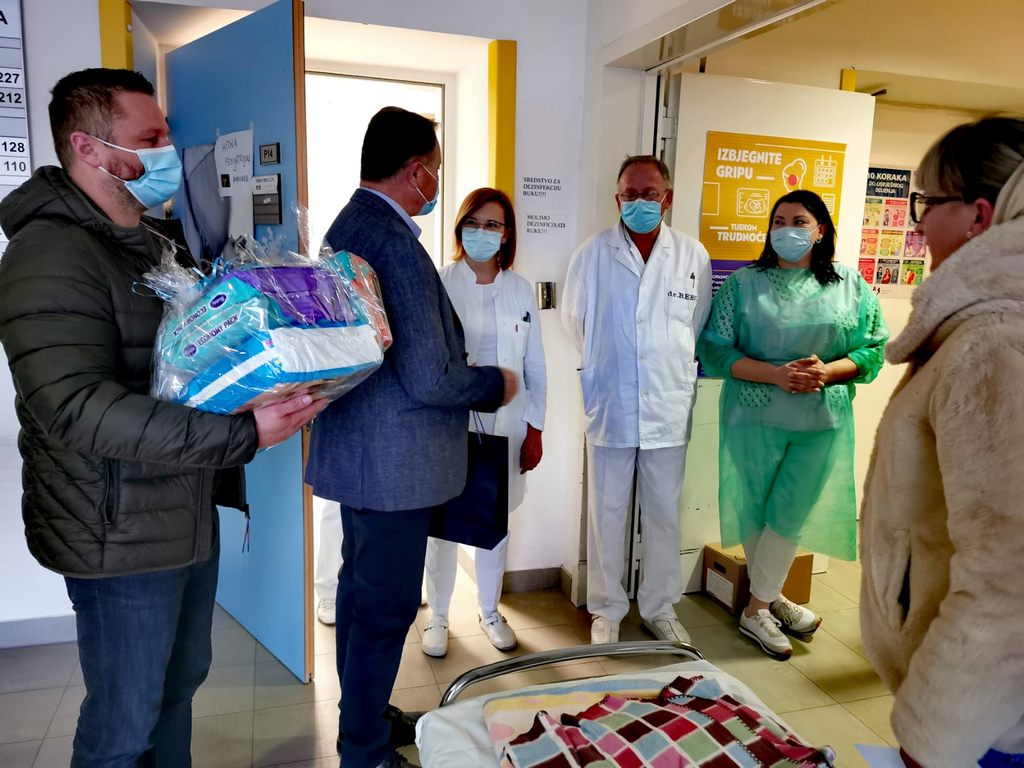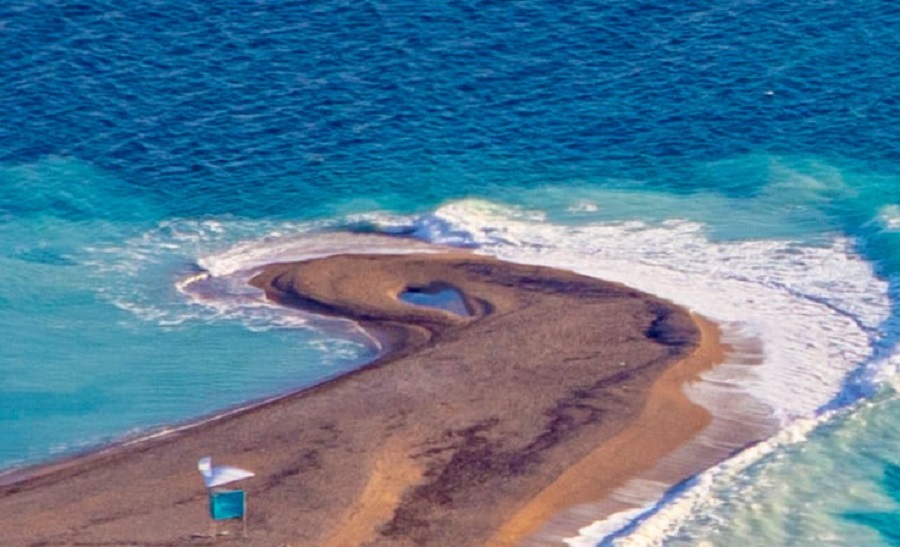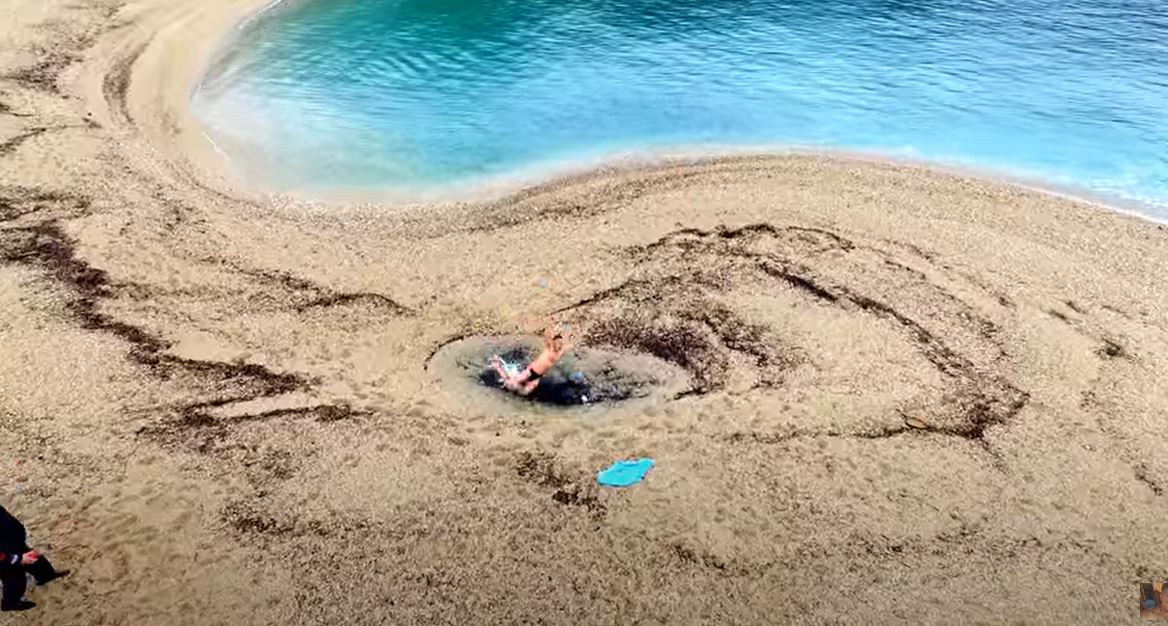Sisak-Moslavina Prefect Ivo Zinic Visits Firstborn Baby in Croatia
January 3, 2021 – Sisak-Moslavina County Prefect Ivo Zinic visited little Daris, the first-born child in Croatia this year, and his mother Nataša Safić, at the Sisak General Hospital "Dr. Ivo Pedišić".
As Hina reports, Sisak-Moslavina County Prefect Ivo Žinić and Deputy Mayor Roman Rosavec visited on Saturday the first child born in Croatia, accompanied by hospital director Tomislav Dujmenović. They congratulated the young mother on her own, but also on behalf of Prime Minister Andrej Plenković.
Along with the occasional gifts, Prefect Žinić stated that this was a joyful moment in the whole agony.
"This symbolic birth in the first minute of the year is a symbol that 2021 will move in a better direction and that new development awaits us this year," Žinić told the gathered journalists.

Source: Sisak-Moslavina County
As reported earlier, the first baby born in Croatia in 2021 was Daris Safić from Petrinja. The mother and child are fine but remain at the Sisak hospital until further notice because the family was left homeless in the devastating earthquake. They slept in the car before going to the maternity ward.
As it is known, the city of Supetar on Brač has pledged to build a house for the Safić family, which will be a permanent solution. After the visit, Žinić said he believes that the remaining problems would be located in the coming days.
"The system is now working well, from local communities to the state. We have established a call center where citizens will be able to respond to their needs. Victims need psychological help, and we will send a professional team to the field on Sunday," said Žinić.
He thanked the Government of the Republic of Croatia, which made all its forces available.

Source: Sisak-Moslavina County
"Material help is just the beginning of the remediation, to bring the situation under control and at the same time, repair minor damage. According to initial estimates, we have 8750 damaged housing and a large number of public buildings. The first task is to take care of people, and we do not want anyone to be forgotten. The first estimates are that the damage amounts to around three billion kunas," Žinić said.
For more on the Petrinja earthquake and to see how you can donate money, food, humanitarian, sanitary, and material aid, follow TCN's dedicated section.
Croatian Musicians Record Song of Support for Earthquake Victims
January 3, 2021 – Just two days after a devastating earthquake hit Croatia, five Croatian musicians showed their big hearts and released a song of support titled "Svi smo uz vas" (We are all with you), dedicated to all earthquake victims, to whom the copyright proceeds will be donated.
The quake that hit the Croatian towns of Petrinja, Sisak, Glina, and surrounding villages on Tuesday, encouraged many volunteers to help, but also some musicians. Desiring to give their contribution with a song, musicians Ivan Zak, Tiho Orlić, Mario Budiščak, Tomislav Priher, and Denis Ferjanić quickly gathered and recorded a song with the symbolic title Svi smo uz vas "(We are all with you).
"It is not enough to say that 2020 was challenging. We were alternately beaten by illness, earthquake, crisis, and this week's earthquakes in Petrinja, Sisak, Glina, and the surrounding area rounded off the unfortunate summary. They wrapped us in black, but also encouraged unity, kindness, and humanity," Ivan Zak told Večernji list.
However, in addition to their support being expressed through music, all copyright proceeds will go to earthquake victims.
"Along with material help, us musicians give our contribution to a song. I wrote this song to try to convey strength and optimism to people in such horrible moments of life. I sang it together with my colleagues Tiho Orlić, Mario Budiščak, Tomislav Priher, Denis Ferjanić," says Zak.
Domagoj Marijan signs the arrangement of the song, and Hit Records released it. Apart from Ivan Zak, other Croatian musicians have recently joined humanitarian and volunteer actions, helping in the field. Many others also appealed for help on their social networks. Singer Lana Jurčević even created a Facebook support group because, as she says, she received hundreds and hundreds of requests to publish information for help.
For more on the Petrinja earthquake and to see how you can donate money, food, humanitarian, sanitary, and material aid, follow TCN's dedicated section.
Petrinja Area Hit by 374 Tremors, Including 109 in Past Two Days
ZAGREB, 2 January, 2021 - The Petrinja area has been hit by 374 tremors since 28 December, including 109 over the past two days, the Zagreb Faculty of Science Department of Geophysics said on Saturday.
The first earthquake was registered at 6.28 a.m. on 28 December, measuring 5 on the Richter scale.
The strongest one struck Petrinja, Glina and Sisak at 12.19 p.m. on 29 December, measuring 6.2.
By 31 December, the area was hit by 265 tremors with magnitudes above 1 on the Richter scale.
Sixty-nine tremors were registered on 1 January and another 40 by 2 p.m. today.
Croatia's Most Famous Beach, Zlatni Rat: A Heart for Petrinja?
January 2, 2021 - Nature is behaving very unpredictably at the moment in Croatia with the Petrinja earthquakes - the latest example a heart for Petrinja on Croatia's most famous and iconic beach, Zlatni Rat in Bol.
Nothing seems normal at the moment in Croatia.
And while there is an outpouring of prayer and support from people all over Croatia (indeed, all over the world), is Mother Nature also sending her support for the victims of the recent earthquake in Petrinja and surrounding area?

Earlier today, we reported on the cloud in the shape of Croatia that hung in the sky above Sisak as the earthquake struck, beautifully captured by Antonija Kmetovic.

A little further south yesterday, on the island of Brac, sharp-eyed photographer Darko Čaleta noticed something rather unusual through his lens from the top of Croatia's tallest mountain, at Vidova Gora, the peak of Brac. Croatia's most famous beach, Zlatni Rat, often shifts position with more extreme weather, and yesterday was no exception, as its tip veered left. And in the movement, it left something quite beautiful and filled with sea-water. Was this indeed a heart for Petrinja? With thanks for Darko for permission to use the photo (above is zoomed in, the original is at the top of this article - you can follow Darko on Facebook).
The timing would indicate that it might be, coming on the same day as the mayor of Supetar (on the same island) pledged to build a house for the first child born in Croatia in 2021 - born just 15 seconds into the New Year, young Daris was born in a hospital in Sisak, into a family from Petrinja whose home had been destroyed and who had been sleeping in their car until the birth.
The Zlatni Rat heart for Petrinja is not the first unusual sighting due to the weather on Bol's iconic beach. Five years ago, water also appeared in the very same spot, and an enterprising (if slightly crazy) local decided to use the opportunity to indulge in the Dalmatian sport of picigin, which involves flying through the air wearing just Speedos, as you can see from the video below.
For more on the Petrinja earthquake and to see how you can donate money, food, humanitarian, sanitary and material aid, follow our dedicated section.
Croatian Ministry of Defence Publishes Drone Footage of Earthquake Damage in Banovina
January 2, 2021 - The Croatian Ministry of Defence has published a video on YouTube outlining the scale of the damage in the Banovina region caused by the recent earthquakes.
As the emergency response to the Petrinja earthquake continues with numerous teams on the ground, more details of the scale of the damage are emerging from the air.
The Croatian Ministry of Defence has today published a video on YouTube, with drone footage of the devastated areas of the Banovina region after the powerful quake on December 29, which killed 7, and which was felt by more than 7 million people in ten countries.
Croatia is today observing a national day of mourning.
For more on the Petrinja earthquake and to see how you can donate money, food, humanitarian, sanitary and material aid, follow our dedicated section.
Mayor Says PM Reassured Him That More Money Would be Awarded to Petrinja
ZAGREB, 2 January, 2021 - The mayor of Petrinja, Darinko Dumbovic, said on Saturday that Prime Minister Andrej Plenkovic had reassured him that there would be more money earmarked for this city which sustained extensive damage in the 29 December quake.
Dumbovic's latest statement ensued after he earlier said that he would not take the allocation for Petrinja in the amount of 30 million kuna, claiming that that relief was being distributed along party lines.
"We are human beings, we are not a stone. We must also react emotionally," Dumbovic, an official of the Reformists party, said adding that he had talked with Prime Minister Plenkovic in the meantime.
I have made it clear to the premier that we must have stronger communication, the mayor said.
FM Thanks Int'l Community, Expats for Swift Quake Relief
ZAGREB, 2 January, 2021- Foreign Minister Gordan Grlic Radman on Saturday thanked the international community and Croatian emigrants for swiftly sending relief to those affected by a 6.2 earthquake in Sisak-Moslavina County, saying the government would not forget anyone affected.
Visiting the area struck on Tuesday, he told press in Lekenik the government was "pleasantly surprised" by the swift response of the international community and Croatian emigrants.
The government immediately requested the activation of the EU Civil Protection Mechanism, and more than half the member states responded in 24 hours, ready to help, said Grlic Radman.
Austria sent containers, Greece was the first to send a plane with 19 tonnes of relief, and Bulgaria and Poland have sent relief too, he said, adding that yesterday he spoke with colleagues from Europe, the Middle East, Asia and North America.
"They wanted to know what the situation was, if more assistance was necessary. They have shown great solidarity and empathy for our tragedy."
European Commission President Ursula von der Leyen immediately called the prime minister and all Croatian ministers were in contact with their EU colleagues, Grlic Radman said.
He especially thanked Croatian emigrants from Australia, America and Germany for responding swiftly and starting to collect aid, saying that reminded him of how it was in the 1990s Homeland War.
Commenting on Petrinja Mayor Darinko Dumbovic's dissatisfaction with the allocation of state funds after the tremor, Grlic Radman said "one should not politicise with millions."
Dumbovic said he would return the government's HRK 30 million in aid because political affiliation was being considered, rather than people and the damage.
"The government set aside that money to show at the beginning the desire, the will for the first rehabilitation to be carried out," he said, adding that "naturally" the government would see "what else is necessary."
Grlic Radman said the Interior Ministry had a well-established civil protection mechanism that was activated immediately. He pledged that all the relief necessary, from camp beds and lamps to containers and caravans, would continue to reach those affected by the tremor.
He underlined that the government would not leave anyone on their own, saying that all Croatian citizens must have a roof over their heads and heating.
"We are all here to help these people, to ease their pain. We can't bring back lives but we can help to reduce the pain, that people feel they are supported, that they are not alone, that they have not been abandoned, that they get a roof over their heads. In any case, we are there for them."
Wreath Laid, Candles Lit for Seven Killed in Earthquake
ZAGREB, 2 January, 2021 - On Saturday, a national day of mourning for the seven killed in Tuesday's devastating earthquake, Petrinja Mayor Darinko Dumbovic and associates laid a wreath and lit candles where 13-year-old Laura Cvijic was killed.
Dumbovic recalled that dozens of people were injured in the 6.2 tremor.
The government on Thursday proclaimed January 2 a day of mourning. Besides the girl killed in the town of Petrinja, five people were killed in the village of Majske Poljane and an organist in a church in the village of Zazina.
According to current estimates, more than 2,000 buildings have been damaged. The centre of Petrinja sustained the biggest damage. Many people in Petrinja, Sisak, Glina and nearby villages have lost their homes. The earthquake has also caused damage in Zagreb and Krapina-Zagorje counties as well as in the City of Zagreb. A magnitude 5.0 foreshock with the epicentre near Petrinja on Monday has caused damage as well.
Relief convoys arriving from everywhere
Access to Petrinja today has almost been jammed due to relief convoys arriving from everywhere, including from abroad. Construction crews are still cleaning up the effects of the tremors, while dozens of construction engineers are inspecting buildings. Famous Croatian chefs are helping too by preparing thousands of meals a day.
Croatian Earthquake Aftershocks: A Home Destroyed, Loan Repayments Unaffected
January 2, 2020 - Among the many Croatian earthquake aftershocks to contend with, homeowners with bank loans but no specialised earthquake insurance face an anxious future.
It is one thing to lose it all, but another thing to then lose it all again.
The TCN inbox has been full of tragic tales and urgent pleas as a result of the tragic events of December 29 in Petrinja, Glina, Sisak, Majske Poljane and surrounding areas - heartbreaking accounts which understandably focus on the immediate need.
And while it is entirely right to focus on the immediate need (learn more on those efforts in TCN's recent tour of the devastated area in Majske Poljane, Glina, Petrinja: A Foreigner View of Croatia's Emergency Response), the ensuing Croatian earthquake aftershocks are not confined to tremors underground, but are also financial.
Consider, for example, the many people in Croatia (both from the Zagreb earthquake of March 22, and the recent quakes around Petrinja), who have had homes partially or totally destroyed, homes that they have bought with the aid of credit from the bank.
Earthquake insurance is a special additional option, and my understanding is that only about 15% of homes in Croatia have this additional policy Which means that 85% do not. With more than 2,000 buildings damaged in Tuesday's quake alone, it does not take a mathematician to work out the scale of the problem.
Having earthquake insurance does not necessarily fix the problem, however, as several people told me after the Zagreb earthquake - the insurance claim success lay in the devil of the detail of the small print, which is rarely worded for the benefit of the consumer. As TCN reported in mid-September, some 6,255 claims had been paid out after the Zagreb earthquake six months earlier, with some claims (according to friends) rejected because an earthquake had to be of a certain magnitude for the insurance to be applicable.
Tragically, there will be cases of people who are uninsured who have lost their homes, and it remains to be seen what longterm help they will receive from the government.
But imagine that you not only have lost your home, but your obligations to that home remain, even if you will no longer have any benefit from it.
One horrible example of such a case was highlighted in 24Sata yesterday. Nutritionist Diana Gluhak Spajic has done some sterling work with her Healthy School Meals programme, and her work has been featured on TCN in the past. Having experienced the Zagreb earthquake in March, she and husband Branimir decided to buy their first home together not in Zagreb but a short drive away, in Sisak.
Both entrepreneurs and directors of their company, they invested their savings and gave the bank the appropriate guarantees, thereby receiving the credit necessary to secure a 30-year loan from the bank to move into their dream home, one of 6 apartments in a building in Sisak.
Timeline November 27, 32 days before disaster struck. There was not even enough time to make the first repayment to the bank before the home was rendered uninhabitable. More tremors since the 24Sata article have resulted in even more damage.
A terrible tale of loss on one level, but a second terrible reality was about to hit.
The property was insured for standard damage but not (like 85% of properties in Croatia) for earthquake damage. And while the bank no doubt had sympathy for their plight and offered a moratorium on repayments, the repayments must come.
Now back in Zagreb paying rent in a temporary place to live which was itself damaged in the March earthquake, the couple simply cannot afford to keep paying rent in one place, as well as loan repayments to a home that they can no longer use. Payments for the next 30 years.
These are, of course, uncertain times and very early days, and one might perhaps also have some sympathy for the banks who are entitled to see their money - they were not the cause of the earthquake. In order to improve its chances of seeing its money, the bank would be within its right to block accounts, take salaries etc., which would result in the probably bankrupting of a small Croatian company.
And with such a terrible situation, arguably the best option available would be one which is being taken by an increasing number of Croatia's youngest and brightest talent - emigration.
Diana and Branimir have started a crowdfunding campaign, details of which are published in full below. While supporting the campaign would be greatly appreciated by the young couple, their plight also highlights the urgent need to address this situation in general - theirs is far from an isolated incident.
Sisak earthquake in Croatia 29.12.2020. charity to fix our home
The devastating earthquake happened on December 29th 2020 and heavily destroyed Sisak-Moslavina County in Croatia; mainly Cities of Sisak, Petrinja and Glina. Cataclysmic earthquake, ranked at 6.4 on Richter scale, had an epicentre near City of Petrinja. 80% od the City of Petrinja was destroyed and most of the City of Sisak. We feel emotionally destroyed furthermore because now we have 50 medium and small earthquakes every day, ranging from 1.5 to 4.9 on the Richter scale. By now, we had 7 casulties, and dozen of people injured. Just by saying this, we are petrified and mentally, very exhausted.
Just one month ago, we just took a bank credit loan to buy this home in the City of Sisak, Frankopanska 5 and before we even had the chance to move, our home was completely destroyed and unhabitable. It was our only home. So we are now at a standstill. :(
Building has cracked on four places and imagine, outer walls are 70cm thick. All of the chimneys have cracked trough the whole building and have collapsed and damaged the roof completely. Some of the chimneys have penetrated the roof and fallen into the building. Hallway on the 1st floor has detached from the building and it is "hanging" and leaning to outer left side, and it is also cracked in numerous places. Building has somehow separated in a few places with huge cracks. In our apartment, we have 43 cracks that we counted so far, and all of the load-bearing walls have cracked completely. Massive damage has happened in our bedroom where the roof has collapsed on our bed where we sleep. Also, all of the windows have cracks from inside to the outer wall.
We don't have the money to rebuild our home. We don't expect that the building will be built again by the government, and we don't have any place to live or to start a family, and the bank doesn't want to cancel the loan contract. This puts us in a situation that really nobody wants to be. We cannot get a new credit loan, nor can we pay this credit loan and pay the rent in another apartment. The credit loan will definitely be in effect, and this means that we will be obliged to pay the loan for the next 30 years that, for the home that doesn't even exist.
I'm very sad to be writing this, as this is a situation I never thought I would be. My only home was destroyed, and I, as a person that was previously helping others, am now asking for complete strangers to help me. Is there someone that understands my situation and wants to help my family and me? Are there still people with kindness in their heart to help us with a small donation? :)
We are asking for your help and support to rebuild our home so we could start our family.
Please, we need 64.000 EUR. If we manage to raise more money, it will be given to our unfortunate neighbours that have also lost their home.
Thank you, Branimir Spajić and Diana Gluhak Spajić
EDIT: Currently there is only the option to pay via Paypal, credit card and bank transfer. Working on other ways of payment.
If you would like to donate to help Diana and Branimir, you can donate here.
For more on the Petrinja earthquake, follow the dedicated TCN section.
Official: Croatian Red Cross Has Collected €4.8m in Donations for Quake Victims
ZAGREB, 2 January, 2021 - The Croatian Red Cross executive president said on Friday that this charity had to date collected HRK 36 million in donations for people who were left without their home in the 29 December devastating quake which struck the towns of Petrinja, Sisak, Glina and other parts of Sisak-Moslavina County.
We continue receiving donations, the executive president Robert Markt told the Nova TV commercial broadcaster on Friday evening.
Asked why some people whose houses were damaged had not yet received containers or mobile homes to sleep in, Markt explained that the quake-hit area covered over 1,000 square kilometres and 305 settlements and this dispersion of settlements could be a reason.
He said that currently, there was no need for new volunteers but in the coming days they would need fresh force.
"This is the operation that will last long and I would like all interested to apply in a few days, we will include them in the operation."
"We all can be proud of our Civil Protection services, and our system of Homeland Protection," said Markt in his comment on what has been done in the first 72 hours since the devastating quake.



